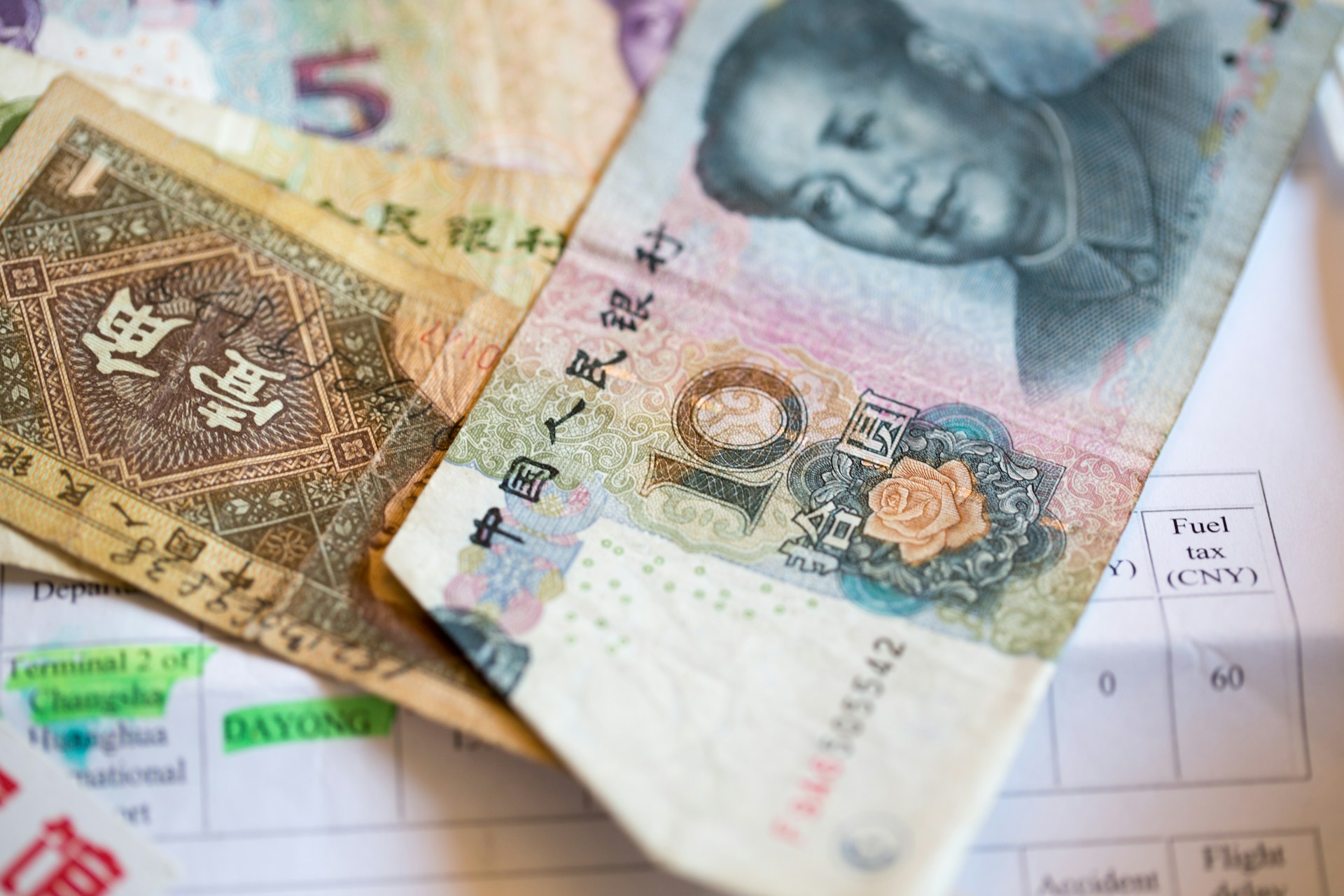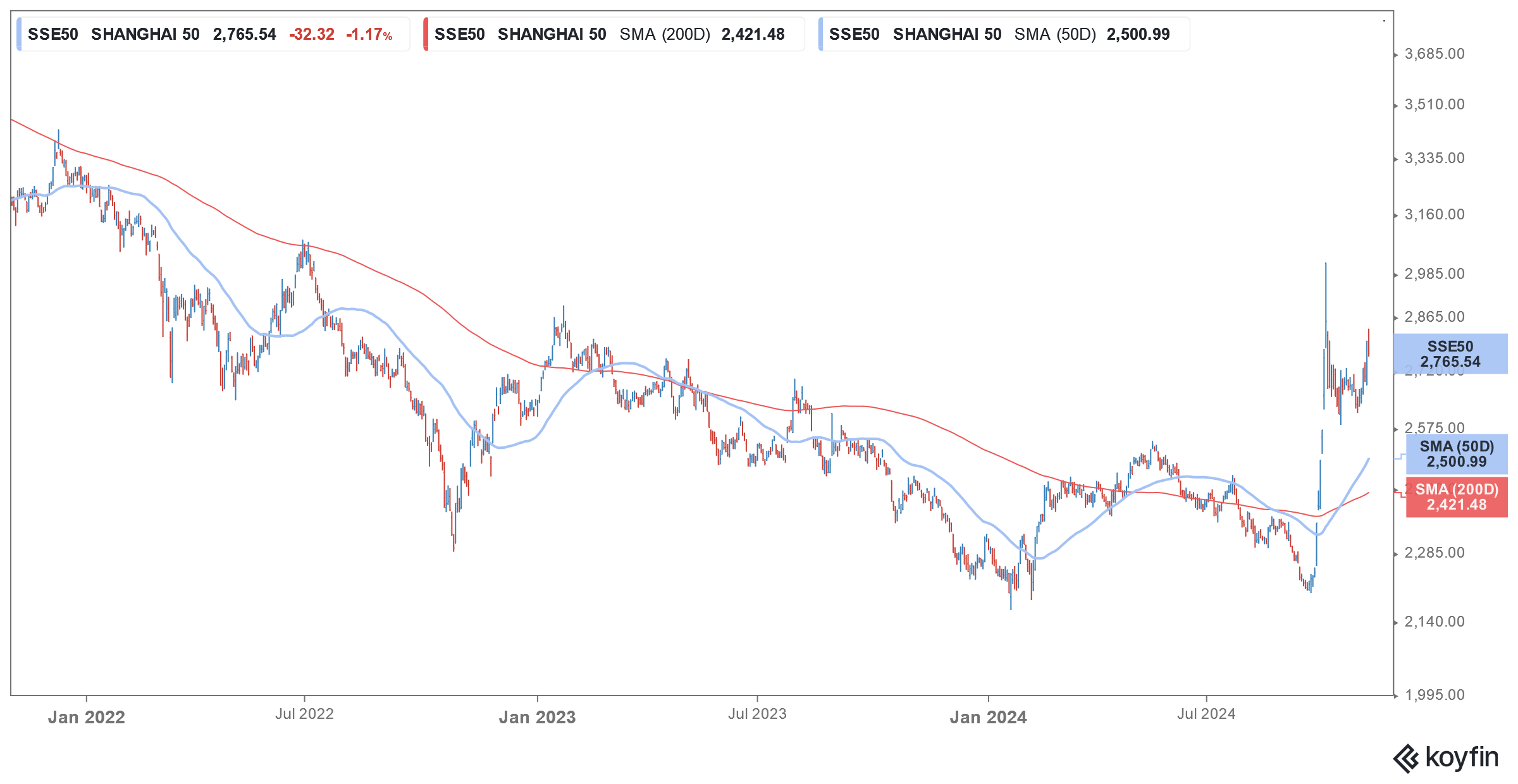
Chinese shares have outperformed global peers since late September when the country started unleashing a bazooka of stimulus to revive its sagging economy. However, while the country has continued to announce more measures, they have failed to enthuse investors and Chinese shares closed in the red on Friday after the company’s $1.4 trillion stimulus package fell short of what markets were expecting.
For context, amid a slowing domestic economy, which most analysts believed would miss the 2024 GDP growth target of 5%, China embarked on a massive stimulus program announcing both monetary and fiscal measures.
Chinese central bank announced monetary policy easing in September
It started with easing monetary policy and in late September the Chinese central bank lowered its 7-day reverse repurchase rate by 20 basis points to 1.5%. It also lowered the reserve requirement ratio for banks by 50 basis points which would make more funds available for lending.
The country followed up with more monetary easing and also eased home buying restrictions to ease pressure on the ailing sector, which was once a key pillar of the world’s second biggest economy.
The country also vowed more fiscal measures despite concerns over its already high debt pile with the finance minister stressing that China has more space to increase its fiscal deficit.
China announced yet another stimulus after the parliament meeting concluded. The package, which is worth 10 trillion yuan (around $1.4 trillion) and is spread across five years, is meant to tackle the burning issue of local government debt and would allow them to borrow more to spur growth.
However, the mega debt swap program fell short of market expectations which expected the country to announce more measures, especially with Donald Trump set to return to the White House next year.
China’s debt swap failed to impress investors
Nomura analysts led by Ting Lu said that while the debt swap would help local governments to save on interest costs and prompt them to borrow more, it is not exactly a stimulus as it is not additional borrowing.
“It seems Beijing needs more time to come up with more exact numbers for fiscal stimulus in coming months, and perhaps more detailed measures will only be released in the annual [National People’s Congress] conference in March 2025,” said Nomura analysts in their note.
Meanwhile, some analysts see more scope for stimulus. “While the market may have to wait for more substantial policy changes, the potential for future monetary and fiscal measures remains,” said Chaoping Zhu, Shanghai-based global market strategist at J.P. Morgan Asset Management.”
Zhu added, “Factors such as a deep stock market correction, export headwinds, or mounting fiscal pressures on local governments could serve as catalysts for policy escalation.”
Larry Hu, chief China economist at Macquarie also echoes similar views and said that China would wait for how US trade policy evolves under Trump before announcing more fiscal measures.
Chinese shares however fell on Friday as the country’s stimulus failed to impress. Notably, Chinese shares have come off their recent highs as the country’s incremental measures haven’t been to the scale that markets expected.
Chinese economy hasn’t recovered much despite the stimulus
While these are still early days, data shows that Chinese stimulus hasn’t had much impact on the country’s sagging economy and the country’s October consumer inflation rose at the slowest pace in four months.
While the rest of the world was battling with multi-year high inflation, Chinese inflation was quite benign and the country was instead worried about deflation. Benign inflation provides legroom to the Chinese central bank to ease its monetary policy, unlike in most other countries where inflation still remains a concern.
Notably, the bulk of the wealth of Chinese households is tied in the real estate sector which is under massive stress. This is prompting Chinese consumers to hold back on their purchases.
Chinese real estate shares jumped on the reports of the government providing a stimulus to the sector. Incidentally, in the past Chinese President Xi Jinping has spoken against speculation in the housing sector. He also clamped down on the tech sector but the government has since taken a much more conciliatory stance amid the worsening slowdown.
Meanwhile, while the country has announced several measures to revive the housing sector they are yet to show meaningful impact.
What does Trump’s return means for China?
US-China trade relations will be in focus in Trump’s presidency. In their note, UBS Global Wealth Management said that Trump’s return “raises the probability of very large tariffs on Chinese exports to the US and challenges the outlook for Chinese stocks.”
The brokerage also warned of a “sentiment impact” and potential downgrade in valuation multiples. “It’s much broader because this is the second derivative of the tariff impact. It’s not just the company itself, [but also] local sentiment consumption and capital-expenditure investments,” said UBS in its note.
Morgan Stanley believes that Trump could use his executive powers to impose tariffs and “it’s not unreasonable for markets to price in a variety of scenarios and related growth pressures.”
However, Abrdn pointed out that Chinese shares actually outperformed in Trump’s first tenure.
Invesco on the other hand sees a long-term case for Asian shares. “Ultimately, investors will care more about valuations and growth differentials rather than trade tensions,” said David Chao, global market strategist for Asia-Pacific excluding Japan.
He added, “This is not only because of the rewiring of supply chains out of China, but also due to the fall in America’s share in China’s exports to 15 per cent this year from 19 per cent at the end of 2017.”
All said, there looks no easy remedy for the structural slowdown in the Chinese economy. The country’s industrial sector has been plagued by a massive overcapacity and with many countries clamping down on imports from China, Chinese companies are struggling to export their overcapacity.
The country has for long been trying to steer its economy from one that’s led by investment and exports to domestic consumption driven, but the pivot hasn’t been as successful amid the tepid consumption growth in the world’s second biggest economy.


Question & Answers (0)